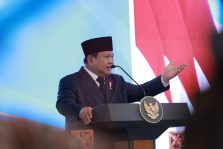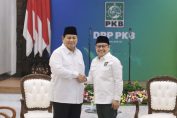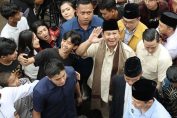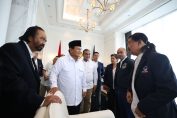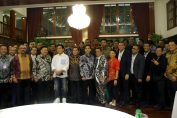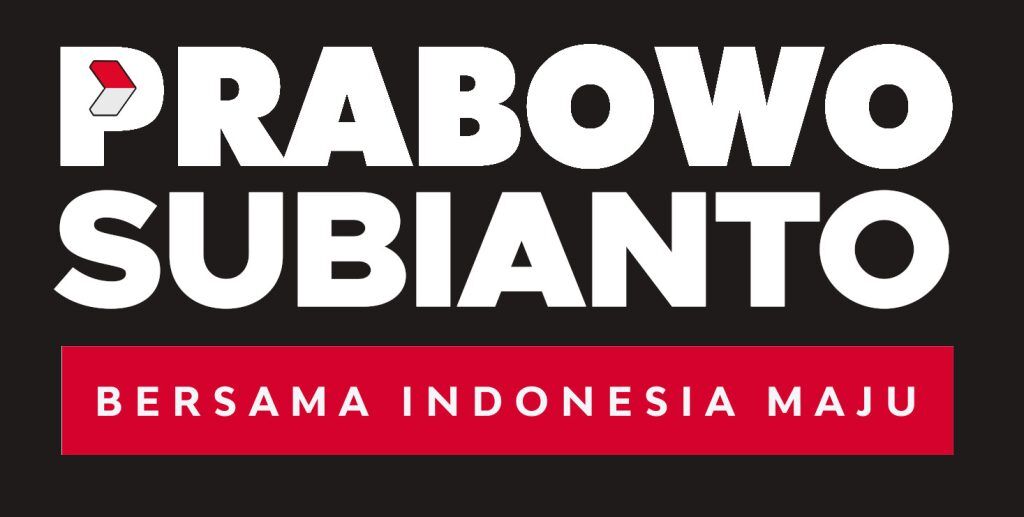By: Prabowo Subianto [excerpted from “National Transformation Strategy: Towards Golden Indonesia 2045,” pages 175-205, 4th softcover edition]
Beyond the eight Quick Impact Programs, the upcoming administration needs to focus on 17 key performance targets with priority programs to achieve the vision of a Golden Indonesia by 2045.
These 17 targets are crucial as they represent the foundational stepping stones or absolute prerequisites for becoming a developed and prosperous nation.
They also demonstrate that we are a nation that learns from history. We are aware of the challenges we face now and in the future (near and far).
We are a nation that chooses to confront our challenges head-on, equipping ourselves with the capability to meet them.
Priority Target 1: Achieving Self-Sufficiency in Food, Energy, and Water
Food, energy, and water are fundamental requirements for a country’s independence and sovereignty. Therefore, achieving self-sufficiency in food, energy, and water must be pursued swiftly and meticulously.
For food, initiatives include developing food estate programs, especially for rice, corn, cassava, soybeans, and sugarcane. A minimum of 4 million hectares of additional crop harvest area is targeted by 2029. With this increased harvest area, assuming it all to be rice fields, there would be an addition of 20 million tons of paddy (assuming a productivity of 5 tons per ha) or equivalent to 10 million tons of rice (assuming a yield of 50%).
In the realm of energy, Indonesia is well-positioned to emerge as a global leader in green energy through the cultivation of bio-diesel and aviation biofuel from palm oil, bio-ethanol from sugarcane and cassava, and the utilization of renewable resources such as hydro, wind, marine, solar, and geothermal power.
By 2029, with the available natural resources, the biodiesel B50 program and ethanol E10 mix will be implemented. Meanwhile, micro-hydro power plants (PLTMH) should be promoted as a solution for providing electricity in remote areas. Water sufficiency will be ensured through proper water management, making it available during droughts and preventing disasters during the rainy season.
Priority Target 2: Refining the National Revenue System
The government is committed to upholding the principles of the 1945 Constitution, specifically Article 23A, which states that all taxes and compulsory levies for state needs must be established by law. This commitment underscores the need for significant enhancements to the national revenue agency’s capabilities, alongside comprehensive reforms in tax policy and systems, aimed at broadening the base of national revenue.
To this end, the state will take concrete breakthrough steps to increase domestic revenue collection. Establishing a National Revenue Agency is expected to raise the national revenue-to-Gross Domestic Product (GDP) ratio to 23%.
Tax policy reform efforts will focus on refining the tax and non-tax revenue system, expanding the tax base and other revenue sources. Tax incentives should be directed to strengthen economic growth, including SMEs and increasing public purchasing power.
Priority Target 3: Eradicating Poverty
Poverty is not just a lack of wealth but a reflection of limited access to the benefits of development. It is also the root cause of a wide array of criminal behaviors and social issues, leading to generations that fall short of their potential.
Eradicating poverty, therefore, must be a cornerstone of government policy. Aiming to eliminate extreme poverty within the first two years of governance and reduce relative poverty to 5% by the end of 2029 are critical objectives.
Priority Target 4: Combating Drug Abuse
Drug abuse is a societal plague that severely undermines both individual productivity and communal well-being.
Effective and comprehensive strategies for preventing and combating the distribution and use of drugs must begin with raising awareness within families. Simultaneously, the government is tasked with sealing off any opportunities for drug smuggling.
Priority Target 5: Ensuring Universal Healthcare Access: Enhancing the Health Insurance Program (BPJS Kesehatan) and Medication Availability
Access to comprehensive and high-quality healthcare is vital for improving the Human Development Index. The ongoing Health Insurance Program (BPJS Kesehatan) requires enhancements and bolstering through widespread medication availability. Enhancing BPJS Kesehatan and ensuring medicine availability are thus key priorities for the government.
Priority Target 6: Enhancing Education, Science and Technology, and Digitalization
A nation’s progress hinges on the quality of its education and mastery of science and technology.
We will continually elevate the quality of education by improving teacher standards, upgrading educational facilities, and broadening access to education. This includes establishing perpetual funds for education, Islamic boarding schools (to develop high-quality santri), cultural endeavors, and NGOs.
Innovation will naturally follow advancements in these areas. Thus, we aim to allocate 1.5-2.0% of the GDP to research and innovation over the next five years.
Government policies bolstering education, science and technology, and digitalization are essential for fostering national autonomy.
Priority Target 7: Preserving Cultural Arts, Boosting the Creative Economy, and Enhancing Sports Achievements
Culture is an integral part of our national identity, and its preservation safeguards our precious heritage. Establishing cultural endowment funds ensures the continuous preservation of our culture. Programs aimed at cultural preservation, boosting the creative economy, and enhancing sports achievements will elevate Indonesia’s profile on the global stage.
Fostering the creative economy through arts, music, film, and other creative industries will also generate new employment opportunities and substantial economic growth.
Priority Target 8: Strengthening Gender Equality and Protecting the Rights of Women, Children, and Persons with Disabilities
Creating a fair and inclusive society requires the state to play a pivotal role in enhancing gender equality and protecting the rights of women, children, and persons with disabilities.
The government must eliminate gender discrimination by advocating for policies and initiatives that safeguard the rights of women and persons with disabilities, including in education, employment, and political participation.
Moreover, the government needs to ramp up its efforts to ensure children receive the necessary protection for their development, which includes access to proper nutrition.
Priority Target 9: Strengthening National Defense and Security and Maintaining Conducive International Relations
Prosperity and peaceful living are achievable within a stable and secure nation. A strong nation can fulfill its aspirations and command respect in dignified international relations.
Priority Target 10: Ensuring Environmental Conservation
In our pursuit of development and economic growth, the sustainability and preservation of the environment are paramount to ensure future generations can live healthily and comfortably.
Therefore, we will expedite our commitments to sustainable development targets, including achieving the Net Zero greenhouse gas emissions goal. This involves efforts to reduce carbon and water footprints across various products and enhance the sustainable management of land, water, and forests. Additionally, the adoption of bioplastics in daily life will be pursued as soon as possible.
Priority Target 11: Ensuring Availability of Fertilizers, Seeds, and Pesticides Directly to Farmers
Food self-sufficiency hinges on achieving sustainable food production and productivity. The availability and comprehensive access to fertilizers, high-quality seeds, and pesticides significantly influence food production and productivity.
Therefore, the government is obligated to ensure the availability and direct access of fertilizers, seeds, and pesticides to farmers. On the other hand, farmers are encouraged to organize institutionally to access more competitive agricultural production resources and secure better prices for their harvests, enhancing their prosperity.
Priority Target 12: Ensuring the Construction of Quality, Affordable, Well-Sanitized Housing for Rural/Urban Communities in Need
Access to decent and affordable housing is a fundamental right for every citizen. Housing development can also strengthen economic growth, reduce poverty, and decrease inequality. The government must ensure the availability of quality, affordable housing with proper sanitation for those in need. The target to guarantee the construction and renovation of 25 houses per village/sub-district per year will achieve two million houses starting in the second year.
In urban areas, it’s crucial to ensure the construction of 500,000 landed houses and 500,000 vertical homes (affordable apartments) known as rusunami (owned public apartments) and rusunawa (rental public apartments). Thus, the target for guaranteeing the construction/renovation of housing reaches three million residential units nationwide.
Priority Target 13: Continuing Economic Equity and Strengthening MSMEs Through Business Credit Programs and the Development of the Nusantara Capital City (IKN) and Other Innovative, Characteristic, Independent Cities
A key to quality economic growth is the equitable distribution of economic growth benefits felt by all segments of society. Expanding the economic scale and building institutional frameworks for Micro, Small, and Medium Enterprises (MSMEs), as well as entrepreneurship, are crucial steps in the equitable distribution of economic growth benefits.
Enhancing programs like Agricultural Business Credit, Livestock Business Credit, Fisheries Business Credit, Plantation Business Credit, People’s Food Production Business Credit, Fishermen Business Credit, Coastal Business Credit, Downstream Industry Business Credit for SMEs, Start-Up Business Credit, and credits for millennials and Gen Z, especially in innovative and technology business fields, will be encouraged, expanded, and increased to foster new entrepreneurs.
Development in Indonesia must become more balanced by creating new growth centers outside Java. One such initiative is the development of the Nusantara Capital City (IKN) and the establishment of 10 innovative, characteristic, and independent cities.
Priority Target 14: Ensuring Harmony Among Religious Communities, Freedom of Worship, Establishment, and Maintenance of Places of Worship
Maintaining harmony among religious communities, freedom of worship, the establishment, and the maintenance of places of worship are vital components of national life. The harmony created strengthens the country, ensuring safety and a harmonious society.
Priority Target 15: Advancing Downstream Processing and Industrialization Based on Natural Resources, Including Maritime Resources, to Maximize Job Creation and Achieve Economic Equity
The drive towards downstream processing and resource-based industrialization is essential for adding economic value, creating jobs, and generating multiplier effects socially and economically. Downstream processing ensures technology transfer, develops local human resources, and maintains environmental sustainability. It has spurred regional economic growth in areas rich in natural resources, promoting equitable economic distribution and industrialization across Eastern Indonesia.
Existing initiatives like nickel downstream processing will continue and expand to include bauxite, copper, tin, agro-products, and maritime products. Strengthening the maritime sector is crucial for supporting industrialization and developing the blue economy.
Indonesia’s natural wealth must be processed within the country. Currently, we lose potential state revenue by exporting unprocessed natural resources at lower prices. Processing these resources domestically would capture additional value.
For example, reports suggest that over 30 years, the loss of added value from exporting copper concentrate could reach USD 108 billion. For natural gas, exporting it raw over the same period resulted in a missed opportunity for an additional USD 225 billion in value. These two commodities alone represent a loss of USD 333 billion or Rp 4,329 trillion in unprocessed value. In 2015, exporting 3 million tons of copper concentrate at USD 1,499 per ton brought in USD 4.5 billion. However, processing it domestically into copper, gold, silver, sulfuric acid, and slag could yield USD 8.1 billion, missing out on USD 3.6 billion or about Rp 46.8 trillion in added value annually.
A similar scenario with natural gas in 2015 showed that exporting 3,100 MMSCD or 20 million tons at USD 7 per MMBtu generated USD 7.2 billion. Processing it into methanol, olefins, and ammonia could have brought in USD 14.7 billion, more than doubling the revenue if processed first.
This issue represents a massive opportunity. By processing our natural resources domestically, Indonesia could become one of the world’s wealthiest nations.
President Joko Widodo has already put a ban on nickel exports in place—one of our essential commodities. Despite facing objections from the World Trade Organization, the President maintains that this export ban is the right approach. This resolve is something we must continue to uphold. It’s more advantageous to export electric vehicle batteries or the vehicles themselves instead of sending raw nickel overseas for processing.
We need the courage to stand up for our country in the global arena. Being bold is necessary because we are in the right, much like others who advocate for their national interests. We must be fearless and equipped to safeguard our own interests.
Beyond nickel, President Joko Widodo is also advocating for the downstream processing of bauxite, copper, tin, natural gas, petroleum, and other Indonesian flagship products. Indeed, Indonesia’s natural riches should be processed domestically. This book’s infographics illustrate the substantial added value we can achieve through consistent downstream processing.
Priority Target 16: Reform in Politics, Law, and Bureaucracy
Politics plays a vital role in our society, governance, and national identity by ensuring everyone’s voice can influence decision-making. Practicing politics responsibly opens doors for community engagement in crucial public decisions.
Equality under the law and reliable law enforcement are fundamental for economic, social, and democratic stability. An efficient, skilled, and ethical bureaucracy is crucial for societal well-being. Implementing digital systems for integrated data management will vastly improve efficiency and uniformity in career development. These steps are essential for ensuring fair political access, fostering a merit-based system, and reducing the influence of money in politics.
Our democracy cannot be left to the whims of mercenaries. We yearn for peace, so we cannot stay silent when the laws we cherish are under threat.
To those who think they’re above the law, we must say: “If you flout the law, be prepared to face the consequences. He who sows the wind, shall reap the whirlwind.”
I’ve queried GERINDRA Party members on their fear of such bullies. If one ally in our democratic journey is threatened, it’s a threat to all of Indonesia. If a democratic partner is harmed, it affects the entire GERINDRA Party.
We always strive for peace and calm because unity and solidarity are necessary in challenging times. Yet, we must not be timid. We can’t be sheep, easily led, deceived, or exploited.
We must be ready to stand for truth, justice, and integrity when necessary. We cannot ignore it when fictitious names are added to voter lists, or when ballot boxes are tampered with outside the agreed process. We must voice our opposition to injustice.
Now, with the advent of the Internet, Facebook, Twitter, Instagram, and other social media, if we see an innocent activist being criminalized, we must speak out and defend them, even if the mainstream media ignores it, possibly due to influence from certain quarters.
Priority Target 17: Corruption Prevention and Eradication
Corruption causes leaks in various aspects of state development financing, damaging the economy and the fabric of social life. Thus, combating corruption through a balanced approach of prevention and action is essential, carried out in a structured and firm manner, to secure economic benefits such as additional financing for the government to accelerate national progress.
Corruption in Indonesia has reached alarming levels. A 5% leak might be dismissed with a shrug, “It’s typical.” At 10%, people might say, “Well, that’s just how it is with friends.” At 15%, it’s still tolerated. Even at 20%, we might still understand. But now, I see more cases where 80% of resources leak away. Projects like bridge constructions collapse without earthquakes, buildings fall before they’re even inaugurated.
Human history and civilization teach us that any nation unable to combat government corruption will ultimately dissolve. Please underline this statement of mine. Take note of what I write.
If Indonesia fails to curb rampant corruption, this nation will falter. This is a lesson from history, beyond doubt.
With corruption, government apparatuses weaken. With corruption, there’s insufficient funding to provide public services. With corruption, the nation lacks the funds to purchase and produce aircraft for its air force, to procure patrol boats for its navy, or to supply ammunition for its army. It cannot afford the necessary equipment for its police.
If the military, air force, navy, army, and police are weak, if prosecutors are corrupt, and if judges are not steadfast, this country is at risk of failure. We’ve all felt it. We’re experiencing it now.
Even before the COVID-19 pandemic, while there was indeed growth and consumption was rising, everything was fragile. Speaking with experts, I find our nation’s condition vulnerable due to the entrenched power of corruptors, making our struggle far from light.
We cannot allow the nation’s wealth to be continuously stolen. Nor can we let corruptors roam free. No! We must push our law enforcers to pursue them to the ends of the earth.
To eradicate corruption from Indonesian soil, we must also set an example. Leading by example is crucial. We need to contribute something positive: a clean political climate that upholds truth and justice. If others can’t, we must.
Our words must hold weight. Let’s not be inconsistent, saying “yes” when we mean “no,” or making promises we can’t keep, as that too is a form of corruption.


